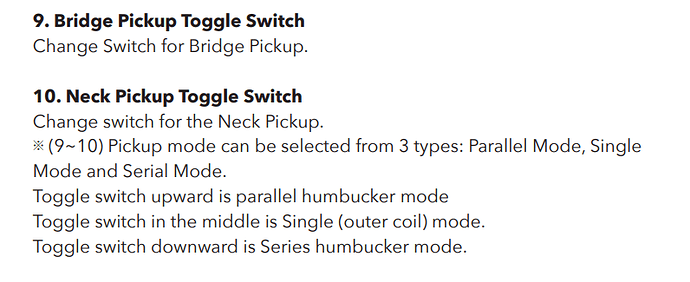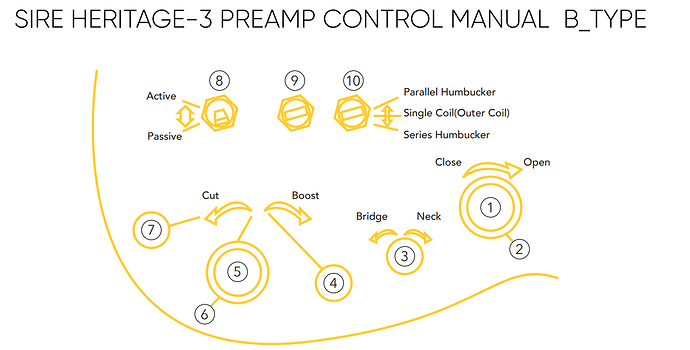I don’t have much experience with Precision basses, but that sounds strange… try plucking closer to the bridge and/or using a pick: does the tone knob affect the tone more in that case? Or maybe use headphones instead of an amp to see if that makes a difference too.
It may also be a component choice. For example, LowEndLobster used to complain about how weak the tone shaping is/was on certain basses.
Also but on a Jazz, the tone change was much more apparent when the pick-ups were set to different volumes because… reasons? ![]()
I’ve already read something along these lines, but it often (and rightfully so) addresses the problem from the music production perspective…
It was (is?) not really clear to me how it translates to a live music setting. Although that’s mostly a mix/sound engineer job, I like to try and understand the general principles (to avoid dumb mistakes, make life easier for everybody, etc).
For example, if an HPF could/should be best applied from a pedalboard or the mixer. I guess, I should talk every time to the guy in charge ![]()
Yeah live is going to be a lot more situational ![]()
How old are your strings? You just might need a fresh set.
It’s funny. I almost never roll off the tone on my bass itself, regardless; it’s just easier to handle this with EQ and I almost always want the higher mids and highs anyway.
But I get it, especially for Motown and so on, it can make sense.
Good question, or if they are flats, where the high end is often dulled anyway. Or if the bass is short scale, where it will always be dulled in the highs compared to a full scale - shorter strings means losing some higher harmonics.
A couple months. They are the strings that came on it. ![]()
And was it new when you bought it, or was it pre-owned? If it was new, it should have come with new strings as well, and at least back then you should have noticed a difference when rolling the tone knob up or down. If it was pre-owned, there’s probably no way of knowing how old the strings are. Either way, I’d replace them if I were you.
It was new and maybe you’re right? I seem to remember it being a bit different, but I don’t recall it being too drastic. I’ll give them a change and see what happens. Thanks!
The thing with strings is: The “deadening” of the strings is a slow process, for me it is always that I don’t really realize it, until some day, usually something like 6 months, it suddenly hits me: That bass really sounded better at some point. That is when I change my strings ![]()
These are calling my name lately, but there’s something in the description that’s unclear and my couple of attempts to find videos hasn’t cleared up any. The description says series/parallel/split for the pickup switch, which seems like it should be 3 position, but in reviews I only see people use it up or down. How do those switches actually work?
Wait.
So now, not only is there NOT JOSH (on bass) but there is NOT NOT JOSH (on guitar)?
Who was playing drums? NOT NOT NOT JOSH?
Where does the madness end, @JoshFossgreen!?
![]()
Thanks! Where did you find their manual? I looked around the website but didn’t see an obvious place it would be.
Yeah, I don’t think their main site links to it for whatever reason, at least not that I’ve found. Truthfully, I can’t remember if the link was included with the Sires I bought, or if I had to search for it. Here’s the main page for all their manuals:
The front of house engineer would probably ask the person next to them if they heard you say that too just to be sure they weren’t hallucinating. If they have a decent desk, they will have plenty of filters and just take care of business. Otherwise, it’s very risky to ask a band member to modify their tone and often turns out badly.
I have a Sire M5. It is essentially equivalent to an M7, except the M7 sports premium top wood and different finishes. The switches on the M5/M7 have three positions, one for each pickup config.
Here are two excellent reviews that go into detail about features, settings and tone examples of the M5/M7.
I might have formulated my thoughts poorly, and that’s also why I haven’t dared to ask many questions to the house engineer on duty and let them work ![]()
With my limited experience, I am glad to delegate the technical part to somebody more experienced and focus on playing… but after the last gig, there were a few comments on how the sound (in general, not the bass specifically) wasn’t the best. Maybe ignorant or overly critical, I don’t know, I couldn’t hear the FoH myself. But if there are ways to simplify (or at least not complicate) other people’s tasks - and limit errors/variance in the result - I am all for it. Especially if it requires buying new gear ![]()
I’m not sure which part of the misunderstanding led to this ![]()
But I sure like to ask the guitarists to turn their amps down ![]()
It will come in time. Remember this: Your left hand is “what you’ve learned from Josh and others.” Your right hand is “who you are.”
As you get better at playing you’ll learn how to alter the tone by how you play your right hand. For now just work on playing.
Very useful video, thanks for posting!
That’s an excellent and comprehensive panorama of EQing applied to bass players, @JoshFossgreen . Very good content for sure !
About buying gear, not saying it’s mandatory but I’d say that having a good (with the good frequencies) graphic EQ would never be a bad thing.
![]()
![]()



